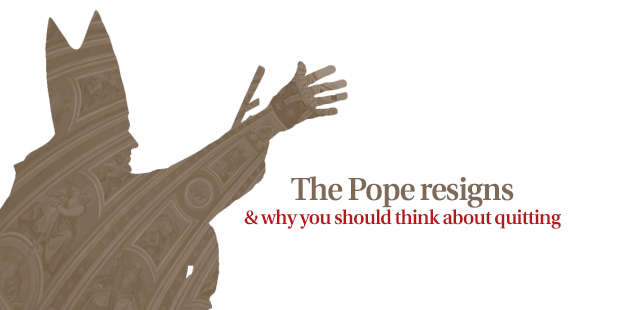
The Pope Resigns and Strategic Quitting
For the first time in 600 years, a Pope resigned.
On February 11, 2013, Pope Benedict XVI issued a letter of resignation stating, “After having repeatedly examined my conscience before God, I have come to the certainty that my strengths, due to an advanced age, are no longer suited to an adequate exercise of the Petrine ministry. I am well aware that this ministry, due to its essential spiritual nature, must be carried out not only with words and deeds, but no less with prayer and suffering.” Click here for the full transcript of his resignation letter.
If the Pope can quit so can you. I am probably not talking about your job; I am definitely talking about ministry programs that aren’t bearing fruit.
Maybe they were fruitful once. Maybe they were fruitful for the guy down the street but never took off in your context. Or, maybe the fruit is dwarfed by the cost. Whatever your reasons for not quitting, let the Pope’s decision inspire you to consider the hidden upside of quitting.
Let’e be honest, nobody likes a quitter and pastors are loath to stop anything that was once done in the name of God. But let’s also keep it real: Jesus gave us a commission to go into all the nations and make disciples. If one of our ministries are using the time, talents, and treasures entrusted to us by God, but not bearing fruit, how will we explain ourselves when we stand before God?
To be clear, I am not advocating reckless abandonment: I am talking about strategic quitting. I propose you consider two economic principals involved in strategic quitting.
1. Sunk costs are the costs that you’ve already put into a project that make it hard to quit. These costs can be complex and dynamic in a ministry setting, but the reality behind sunk costs is that they are, well, sunk–the’re already spent. If the fruit isn’t there, we should consider moving on rather than repeating fruitless activity that continues to burn up more resources that could otherwise be redirected.
2. Opportunity cost counts the cost of an opportunity taken in terms of the value the related opportunity missed. In other words, for every dollar or moment you spend doing one thing, that dollar and moment could have been spent on something else. The value of that something else is the opportunity cost.
Strategic quitting is a part of visionary leadership. The Pope’s decision to resign leads the church forward. He had the maturity to trust his successors and freely yield the reigns of his power. Ultimately, he had the vision to see that a younger and more vital Bishop could be a better fit for the office and that by resigning he could break the calcification of tradition for the sake of his church and all the Bishops of Rome who will follow him.
Jesus commissions us to makes disciples. Measuring only the success of our strategies (in numbers and dollars) or the busyness of our activities isn’t sufficient. We need to measure the fruitfulness of our ministry and be willing to strategically quit.
What and how can you strategically quit to lead upward?
FYI…for a five minute podcast on sunk costs and opportunity costs from Marketplace click here.
Read more from Mike here.

Tags: Clarity, Recapturing Vision, Strategy, Vision Frame











